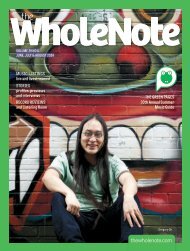Volume 25 Issue 6 - March 2020
FEATURED: Music & Health writer Vivien Fellegi explores music, blindness & the plasticity of perception; David Jaeger digs into Gustavo Gimeno's plans for new music in his upcoming first season as music director at TSO; pianist James Rhodes, here for an early March recital, speaks his mind in a Q&A with Paul Ennis; and Lydia Perovic talks music and more with rising Turkish-Canadian mezzo Beste Kalender. Also, among our columns, Peggy Baker Dance Projects headlines Wende Bartley's In with the New; Steve Wallace's Jazz Notes rushes in definitionally where many fear to tread; ... and more.
FEATURED: Music & Health writer Vivien Fellegi explores music, blindness & the plasticity of perception; David Jaeger digs into Gustavo Gimeno's plans for new music in his upcoming first season as music director at TSO; pianist James Rhodes, here for an early March recital, speaks his mind in a Q&A with Paul Ennis; and Lydia Perovic talks music and more with rising Turkish-Canadian mezzo Beste Kalender. Also, among our columns, Peggy Baker Dance Projects headlines Wende Bartley's In with the New; Steve Wallace's Jazz Notes rushes in definitionally where many fear to tread; ... and more.
Create successful ePaper yourself
Turn your PDF publications into a flip-book with our unique Google optimized e-Paper software.
ART OF SONG<br />
JOSE GUTIÉRREZ<br />
recorded and lived with them for decades. I know them better than<br />
Beethoven.’ I think there’s something in that. Every time I play them I<br />
discover something new. A different stress on one beat, a hidden inner<br />
melody, a tiny inflection in half of a bar…. There is an infinite world<br />
inside them.<br />
Did you have any particular heroes who contributed to your<br />
understanding of Beethoven?<br />
Gould, obviously. Also Teodor Currentzis. [chief conductor of<br />
the SWR Symphony Orchestra Stuttgart and artistic director of the<br />
ensemble musicAeterna and of the musicAeterna Chamber Choir]<br />
He’s the greatest living conductor (don’t even try to argue with me<br />
about that). Sokolov too – he makes the sonatas sound as if you’re<br />
hearing them for the first time.<br />
Talking to the audience and contextualizing the music you’re<br />
about to play, why you chose it and what it means to you, was very<br />
prescient when you began doing it more than a decade ago. Now it’s<br />
part of the zeitgeist. How did it come about?<br />
I don’t think it’s that common sadly. I wish more musicians would<br />
do it. Imagine hearing Zimerman discussing Schubert for a few<br />
minutes before playing D960! I’d die of joy. I would always choose to<br />
introduce a piece for a couple of minutes before playing it and then<br />
turn the lights off and let people disappear with the music, instead<br />
of having the audience reading program notes about sonata form in<br />
Beethoven’s Vienna while I’m playing the bloody thing. There are so<br />
many things in classical music that are considered a blasphemy. So<br />
many unspoken rules. Sometimes you feel like you’re going to church<br />
instead of a recital. This music is so immortal and has sadly been<br />
appropriated by a certain group of people for their enjoyment only.<br />
It’s desperate. Classical music is not high art. It’s not something you<br />
must understand in order to ‘appreciate it’ (whatever that means). It<br />
is simply a connection with a part of ourselves that is too easily lost in<br />
this age of always-on, super-fast distraction.<br />
BESTE<br />
KALENDER<br />
MEZZO<br />
RISING<br />
LYDIA PEROVIĆ<br />
The year <strong>2020</strong> is coming up roses for<br />
mezzo-soprano Beste Kalender, who grew<br />
up in Turkey and moved to Canada at<br />
the age of 22 to pursue two great interests – postgraduate<br />
research in the psychology of musical<br />
cognition, and professional singing. One of those<br />
is now clearly taking over, and the current year<br />
is marked by gigs that she finds particularly<br />
meaningful. “I hope I won’t be just a singer who<br />
sings pretty music and has no other interests,” she<br />
says when we meet in the RCM cafe, deserted for<br />
the long weekend. Our voices are ringing in the<br />
empty space but the security guy on duty doesn’t<br />
seem to mind us being there. “I’d like to be able<br />
to engage with larger issues and causes. And have<br />
my own distinct voice. This year feels like I do.”<br />
The Glenn Gould Foundation presents “In Conversation with<br />
James Rhodes” on Wednesday <strong>March</strong> 4 at 7:30pm, in the Isabel<br />
Bader Theatre.<br />
The Glenn Gould Foundation presents James Rhodes: “The<br />
Beethoven Revolution” on Thursday <strong>March</strong> 5 at 8pm, in Koerner Hall.<br />
Paul Ennis is the managing editor of The WholeNote.<br />
12 | <strong>March</strong> <strong>2020</strong> thewholenote.com


















